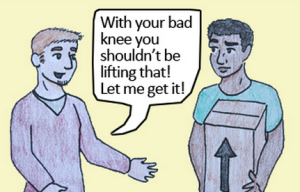
Closeup on a parent and child’s hands holding a red piggy bank with a $20 bill sticking out of the top.
We were at a party when the topic of baby music classes came up.
My one-year-old adores music, but despite the popularity of various music programs for infants and toddlers, my wife and I haven’t enrolled him in any classes.
The reason we haven’t is a relatively simple one: We just can’t afford it.
Classism is usually defined as prejudice against, or discrimination against, people of a particular social class. For lower-income people, classism can be overwhelming. First we have to navigate the world with our very real economic limitations, and then we have to deal with people and institutions treating us poorly on top of it.
As a person from a working-class background, who currently lives below the US poverty line, I’m no stranger to classism! However, I wasn’t prepared for how ubiquitous classist attitudes would be when I became a parent.
Both myself and my wife work, and we do our very best to provide for our little family. Most of the time, I feel fairly good about what we’re able to accomplish with our limited income, but we certainly struggle financially.
And that struggle is never more obvious than when it is thrown into sharp relief by someone else’s assumptions about how we should be parenting.
“Have you done Music Together?” my friend asked me, referring to a specific and popular program.
“Um, no, I don’t think we’re going to,” I replied, anxious to steer the conversation onto something else. “But we listen to a lot of music at home!”
She shook her head. “No, you need to do Music Together. You just have to. Listen, it’s specifically designed to increase the child’s musical aptitude. If you don’t do it soon, it’ll be too late.”
While comments like this may be well-meaning, they often miss that not all parents have the same resources.
It’s really painful to be told that you’re failing your child simply because you don’t have the money to do every single that our culture has decided is “best” for them.
I’ve found that classist attitudes are incredibly widespread in online and offline parenting communities. It can be really hard to challenge those classist assumptions because when people call out problematic views, folks just tend to assert that they only “want what’s best” for kids.
But when does that concern reach too far?
At a certain point, it starts to sound like many people think “what’s best” for children is to be raised in a middle- or upper-class home. But parenting isn’t a luxury activity only allowed for people of means. Many, many working-class and poor people are parenting right now – and doing a damn good job of it, too.
So here are five questions you can ask yourself to determine if your attitudes about parenting and families could be unintentionally classist.
If you know what they are, it’s easier to challenge them and have a more inclusive view of families of all different classes and income levels.
1. How Do You Define Readiness for Parenting?
What do you think of when you think of a person being “ready” to have a baby?
This question is going to have different answers for different people! I’ve found that a lot of the things that people think make someone ready to have a kid, however, have to do with money.
Long before I had a child, I was musing about the possibility of becoming a mom. Standing in my kitchen, I told a friend that I was hoping to try to have a baby sooner rather than later.
She expressed excitement for me, and then she said, “And I know you’ll do it right, too, like, you’ll make sure you have money set aside for emergencies and college and things like that!”
There’s nothing wrong with setting aside money! If you can do it, it can make surviving in capitalism so much easier.
But the idea that something like a college fund is a prerequisite for parenthood is, in fact, deeply classist.
How much money people expect you to have put away can vary along class and cultural lines, but the idea is pervasive. What people miss is that this is effectively barring some people from parenthood altogether.
Do we really think that only people who can afford to bankroll college deserve to have children? I sure hope not.
There are more indirect versions of this same idea as well. Maybe you think would be parents should own their own home before taking on dependents. Or that you’re not really ready until you get a “stable job with benefits.”
What all of these things have in common though, is that they define preparedness for parenthood in terms of wealth.
By doing so, they tell lower-income parents that they aren’t really “ready” simply by virtue of their economic standing.
That’s unfair (some of us will never be able to own our own homes, or have $20K in savings, or whatever), untrue, and incredibly classist.
2. What Defines ‘Good Parenting’ Anyway?
Once people have kids, it’s easy fall into the trap of judging their parenting. As a society, we often label parents as “good” or “bad” and don’t think about where those assumptions come from.
And while some things cross class lines – for example, abuse is always bad parenting – a lot of times, we define “good parents” as “parents of economic means.”
This one is really sneaky; I’ve probably done it myself without even noticing.
It just so happens that in our capitalist society, a lot of the things that we think of as examples of being a good parent cost money.
Let’s go back to the music lessons example.
My friend wasn’t intentionally trying to say that only parents with a certain amount of money can parent well. But she made it pretty clear that she felt like having my toddler in music classes was absolutely essential. To not enroll him would be neglecting his musical needs, and that’s bad parenting.
Of course, music lessons – as well as swimming lessons, trips to the hands-on museum, and a whole host of other enrichment activities for little kids – all cost money.
And even after you’ve paid for the class, there’s transportation and the daunting task of working such a thing into a family’s schedule.
For many of us, it just isn’t a realistic option.
And while it’s one thing to think that these kinds of activities are great, it’s something else to turn your nose up at all parents who don’t do them.
It may be that they aren’t doing all of the various classes and programs because they just can’t, not because they don’t care.
Take a good, long look at all of the examples of “good parenting” you can think of, and see how many of them require some cash.
If you can’t imagine a good parent without expendable income, it’s a good idea to reassess.
3. What Objects Do You Consider Necessary and Affordable for Parenting?
The stuff that parents feel they need can vary pretty widely!
People with different cultural backgrounds are going to have different opinions on the stuff that it takes to care for a new baby, as well as an older kid. All of that makes sense because some pretty specific items have sprung up around making sure babies needs get met around the world.
But the way we apply those ideas about the stuff that children need can quickly cross the line into classism. And it doesn’t help that baby product advertisers are working hard to make it seem like we need more than we actually do!
When my son was born, we had some slightly minimalist ideas about baby supplies, but we also had next to no money. Almost everything that we had for him was used (excluding items with which that can be a safety issue). My wife and I were fine with the setup, but other people often are not.
When we told people that we didn’t own one of those baby swings, they would look at us like we were raising our child in a cave.
If you just assume that it’s absolutely necessary for a new parent to have a crib, a bassinet, a rocker, a swing, a bouncy seat, among oodles and oodles and oodles of other things, check yourself.
It’s likely that you’re discounting the real parenting experiences of folks who can’t afford a lot that stuff, but are managing just fine.
Also, be wary of insisting that certain items are affordable for everyone. What looks affordable to you may look completely unattainable to a family just barely scraping by.
4. Do You Degrade the Choices Lower-Income Parents Make Out of Necessity?
It’s one thing to love breastfeeding, but it’s another thing to consider every lactating parent a failure if they don’t “choose” to breastfeed.
I put the word “choose” in quotes just now for a reason. Many times, having limited resources limits our options. The choices we make aren’t entirely our own in these cases; we’re doing what we have to do for survival.
In the case of breastfeeding, many low-income parents can’t access enough time off work to establish a breastfeeding relationship, frequent and long enough breaks while at work to pump enough, or support for breastfeeding.
Deriding these parents for “choosing” formula is unfair and (yes) classist.
And it isn’t only breastfeeding! Low-income parents may also choose less traditional childcare options or buy non-organic produce. Our culture likes to view all of these things as choices, as if they are all nothing more than a matter of parenting style and beliefs.
But even if you believe that something is the wrong choice, is it fair to degrade parents who weren’t actually given a choice?
If I don’t buy all organic vegetables for my child, does that make me a bad mom?
What if the alternative is not having enough to eat?
5. How Do You Frame Success for Low-Income Kids?
I try hard to think of success in life as mostly living the life you want to live, and being relatively happy. I’m not unique in that! While there’s a ton of focus on money in our culture, lots of us agree that it isn’t actually the most important thing in the world.
However, even amongst those of us who don’t define success in terms of big houses and fancy cars, there is a group for which we usually fail to have a broader definition of success – and that group is poor children.
Almost without fail, when it comes to poor kids, the only success people can envision for them is—well—not being poor anymore. The concept of upward mobility may mean that people of all classes hope the next generation will have more than they did, but it is a particular kind of insidious for low-income people.
Poor kids are expected to find a way to make more than their parents, and often to completely leave their parents’ community in the process. Anything else is often treated as a failure.
The fact is, you can’t say that you have nothing against low-income parents if you earnestly view the goal of low-income parenting is to produce kids who are no longer low income.
If you think that a child from a low-income background growing up to parent within their same community and social class is some kind of failure, than it’s clear that you never thought low-income parenting was acceptable in the first place.
***
Classism is insidious in our culture, and particularly so in parenting culture.
We frame things as choices that aren’t real choices for many, treat as necessities things that are totally inaccessible for some, and consider success solely in terms of economics.
For a low-income parent, interacting with the parenting universe can feel like moving through a minefield of judgment.
It’s important that we realize that while poverty can be difficult for children, classism only compounds the difficulties that are already there. Ours is a culture stratified by class, and people of all different social and economic classes have children and raise them.
Stigmatizing some of them for parenting won’t help them, and it certainly won’t help their kids.
[do_widget id=’text-101′]
Katherine DM Clover is a Contributing Writer for Everyday Feminism. She is a mother, recovering fine artist, and a writer focusing primarily on parenting, queer issues, and feminism. She lives in Detroit, Michigan with her wife and child, and their three cats, and she just learned how to make pie crust. Read her blog, Post Nuclear Era, or follow her on Twitter @postnuclear_mama.
Search our 3000+ articles!
Read our articles about:
Our online racial justice training
Used by hundreds of universities, non-profits, and businesses.
Click to learn more




















